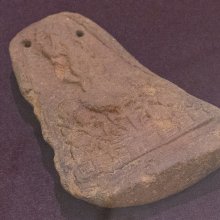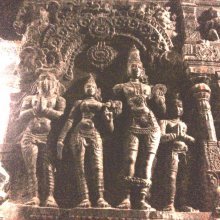Padmashri, Padmaśrī: 8 definitions
Introduction:
Padmashri means something in Buddhism, Pali, Jainism, Prakrit, Hinduism, Sanskrit. If you want to know the exact meaning, history, etymology or English translation of this term then check out the descriptions on this page. Add your comment or reference to a book if you want to contribute to this summary article.
The Sanskrit term Padmaśrī can be transliterated into English as Padmasri or Padmashri, using the IAST transliteration scheme (?).
Images (photo gallery)
In Buddhism
Mahayana (major branch of Buddhism)
Source: Wisdom Library: Maha Prajnaparamita SastraPadmaśrī (पद्मश्री) is the name of the Buddha of the Padma universe according to the 2nd century Mahāprajñāpāramitāśāstra (chapter XV). Accordingly, “In the region of the nadir (adhas), beyond universes as numerous as the sands of the Ganges and at the extreme limit of these universes, there is the universe called Houa (Padma); its Buddha is called Houa tö (Padmaśrī) and its Bodhisattva Houa chang (Padmottara)”.
Note: This Buddha is called Chan tö “beauty of the good” in the Chinese text (Chin. Houa tö), but Padmaśrī “beauty of the lotus” (Chin. Houa tö) in the Sanskrit text of the Pañcaviṃśati. This last reading is the proper one.

Mahayana (महायान, mahāyāna) is a major branch of Buddhism focusing on the path of a Bodhisattva (spiritual aspirants/ enlightened beings). Extant literature is vast and primarely composed in the Sanskrit language. There are many sūtras of which some of the earliest are the various Prajñāpāramitā sūtras.
In Jainism
General definition (in Jainism)
Source: archive.org: TrisastisalakapurusacaritraPadmaśrī (पद्मश्री) is the daughter of Vidyādhara-king Meghanāda, according to chapter 6.3 [ānanda-puruṣapuṇḍarīka-bali-caritra] of Hemacandra’s 11th century Triṣaṣṭiśalākāpuruṣacaritra: an ancient Sanskrit epic poem narrating the history and legends of sixty-three illustrious persons in Jainism.
Accordingly:—“Now in the city Ariñjaya on Mt. Vaitāḍhya there was a well-known Vidyādhara-king, Meghanāda, to whom power over the two rows (of cities) had been given by Cakrin Subhūma. He was the father of Padmaśrī, the wife of the same Cakrabhṛt. Suketu’s soul, after it had wandered through existence was born as the Prativiṣṇu Bali in Meghanāda’s family in this same city. He, with a life-term of fifty thousand years, black, twenty-six bows tall, became the ruler of three parts (of Bharata)”.

Jainism is an Indian religion of Dharma whose doctrine revolves around harmlessness (ahimsa) towards every living being. The two major branches (Digambara and Svetambara) of Jainism stimulate self-control (or, shramana, ‘self-reliance’) and spiritual development through a path of peace for the soul to progess to the ultimate goal.
Languages of India and abroad
Sanskrit dictionary
Source: Cologne Digital Sanskrit Dictionaries: Edgerton Buddhist Hybrid Sanskrit DictionaryPadmaśrī (पद्मश्री).—(1) m., name of a Bodhisattva: Saddharmapuṇḍarīka 3.8; 431.3 ff.; 470.3; (2) m., name of a Tathāgata: Śatasāhasrikā-prajñāpāramitā 50.7; (3) f., name of a lokadhātu: Gaṇḍavyūha 536.22.
Source: Cologne Digital Sanskrit Dictionaries: Aufrecht Catalogus CatalogorumPadmaśrī (पद्मश्री) as mentioned in Aufrecht’s Catalogus Catalogorum:—a lady who wrote on Kāmaśāstra. Śp. p. 46.
Source: Cologne Digital Sanskrit Dictionaries: Monier-Williams Sanskrit-English Dictionary1) Padmaśrī (पद्मश्री):—[=padma-śrī] [from padma] f. ‘beautiful as a lotus flower’, Name of Avalokiteśvara, [Kāraṇḍa-vyūha]
2) [v.s. ...] of a Bodhi-sattva
3) [v.s. ...] Name of sub voce women, [Rājataraṅgiṇī; Hemacandra’s Pariśiṣṭaparvan]
4) [v.s. ...] of a lady who wrote on Kāma-śāstra, [Catalogue(s)]
[Sanskrit to German]
Sanskrit, also spelled संस्कृतम् (saṃskṛtam), is an ancient language of India commonly seen as the grandmother of the Indo-European language family (even English!). Closely allied with Prakrit and Pali, Sanskrit is more exhaustive in both grammar and terms and has the most extensive collection of literature in the world, greatly surpassing its sister-languages Greek and Latin.
Kannada-English dictionary
Source: Alar: Kannada-English corpusPadmaśrī (ಪದ್ಮಶ್ರೀ):—[noun] a title given by the Indian Government to civilians in recognition of distinguished service, achievement in various fields.
Kannada is a Dravidian language (as opposed to the Indo-European language family) mainly spoken in the southwestern region of India.
See also (Relevant definitions)
Starts with: Padmashrigarbha, Padmashrigarbhasambhava.
Full-text: Padmashrigarbha, Shubhavyuha, Padmottara, Padma, Arimjaya, Adhas, Adhastat.
Relevant text
Search found 11 books and stories containing Padmashri, Padmaśrī, Padmasri, Padma-shri, Padma-śrī, Padma-sri, Padmaśri, Padma-śri; (plurals include: Padmashris, Padmaśrīs, Padmasris, shris, śrīs, sris, Padmaśris, śris). You can also click to the full overview containing English textual excerpts. Below are direct links for the most relevant articles:
Kamashastra Discourse (Life in Ancient India) (by Nidheesh Kannan B.)
8.3. The Body in Kāmaśāstra < [Chapter 5 - Looking for Alternatives: Possibilities in Kāmaśāstra]
2. Works on Kāmaśāstra (c): Nāgarasarvasva < [Chapter 2 - An Appraisal of Kāmaśāstra Works in Sanskrit]
7.2. The Sixty-four Coition Arts < [Chapter 5 - Looking for Alternatives: Possibilities in Kāmaśāstra]
Trishashti Shalaka Purusha Caritra (by Helen M. Johnson)
Part 3: Birth of Bali < [Chapter III - Ānandapuruṣapuṇḍarīkabalicaritra]
Part 5: Death of Rāma < [Chapter IV - Subhūmacakravartīcaritra]
Part 1: Vasudevahiṇḍi (the wanderings of Vasudeva) < [Chapter IV - Vasudevahiṇḍi]
The Dance of Siva < [October 1990 – December, 1990]
Book Reviews < [October – December, 1995]
Let the Stream of Compassion flow < [July – September 1975]
Maha Prajnaparamita Sastra (by Gelongma Karma Migme Chödrön)
Act 10.7: The universes and Buddhas of the ten directions < [Chapter XV - The Arrival of the Bodhisattvas of the Ten Directions]
Bhagavati-sutra (Viyaha-pannatti) (by K. C. Lalwani)
Part 3 - On patriarchs < [Chapter 5]

